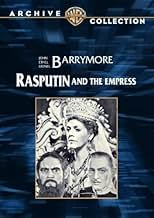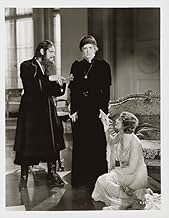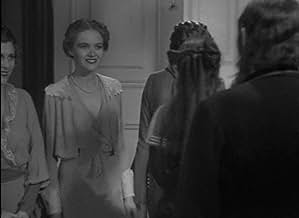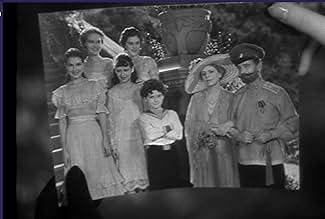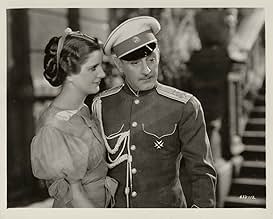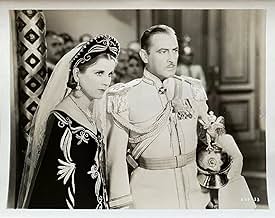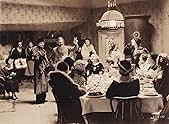IMDb RATING
6.5/10
1.3K
YOUR RATING
A prince plots to kill the mad monk Rasputin for the good of the czar, the czarina and Russia.A prince plots to kill the mad monk Rasputin for the good of the czar, the czarina and Russia.A prince plots to kill the mad monk Rasputin for the good of the czar, the czarina and Russia.
- Nominated for 1 Oscar
- 4 wins & 1 nomination total
Luis Alberni
- Photographer's Assistant
- (uncredited)
Mary Alden
- Natasha's Lady in Waiting
- (uncredited)
Robert Anderson
- Undetermined Secondary Role
- (uncredited)
Oscar Apfel
- Undetermined Secondary Role
- (uncredited)
Henry Armetta
- Photographer
- (uncredited)
Hooper Atchley
- Rasputin's Henchman
- (uncredited)
Mischa Auer
- Butler Pouring Drinks at Party
- (uncredited)
Barbara Barondess
- Woman Getting Cigarette
- (uncredited)
Max Barwyn
- Bald Man Trying to See Duna
- (uncredited)
Featured review
By now, everyone - but everyone - has commented on what bad history this movie is. Fine, I won't argue the point. But, what about it as drama? In my opinion, this is one of the most powerful tales of tragedy of it's time. ( This is particularly noteworthy given MGM's later penchant for frivolousness. ) Part of it has do do with the sincerity and conviction of the story. [ Alhough Charles MacArtur and others are given credit for the screenplay, I believe the original story - I have read a copy of the book - was written by a Russian émigré who fled the revolution. Unfortunately, I am presently unable to locate my copy. ] Nonetheless, this would go a long way towards explaining the movie's passion.
As for the acting; it features an outstanding cast, including the three Barrymores, as well as an assemblage of first rate supporting actors of the time. ( Anyone notice Edwarld Arnold as Dr. Remezov? ) Of course, much of it seems dated by today's standards. ( This was 1932, after all. ) Keep in mind that this is high melodrama. In that context, Lionel Barrymore exudes pure evil as the scheming, mad monk. He also brings out the crudity and vulgarity of the man, which generally jibes with historical accounts. Just try not to dwell on the fake beard.
John is fine and properly earnest as Prince Chegodieff, although his performance does seem a bit old-fashioned next to Lionel's. He really lets it all hang out in the murder scene, however. Ethel seems a trifle stiff, but Ralph Morgan is just right as Nicholas. In fact, sincerity and seriousness of purpose seem to be the hallmarks of the entire ensemble. And through it all, there is this sense of tragic inevitability; of events that, once set in motion, cannot be reversed.
One other thing that warrants a mention is the music. The Russian Orthodox liturgical music used in the celebratory scene near the beginning is moving and powerful. It could well put one in mind of the the wedding scene in Michael Cimino's "The Deer Hunter" ( 1978 ). Later, there is a medley of martial music, accompanied by historical footage, as Russia mobilizes for The Great War. Here we hear "God Save the Tsar", a tune which Mikhail Glinka featured in his opera, "A Life for the Tsar", but which was routinely banned during Soviet performances. All in all, exciting stuff.
This is a movie well worth watching, historical accuracy notwithstanding.
As for the acting; it features an outstanding cast, including the three Barrymores, as well as an assemblage of first rate supporting actors of the time. ( Anyone notice Edwarld Arnold as Dr. Remezov? ) Of course, much of it seems dated by today's standards. ( This was 1932, after all. ) Keep in mind that this is high melodrama. In that context, Lionel Barrymore exudes pure evil as the scheming, mad monk. He also brings out the crudity and vulgarity of the man, which generally jibes with historical accounts. Just try not to dwell on the fake beard.
John is fine and properly earnest as Prince Chegodieff, although his performance does seem a bit old-fashioned next to Lionel's. He really lets it all hang out in the murder scene, however. Ethel seems a trifle stiff, but Ralph Morgan is just right as Nicholas. In fact, sincerity and seriousness of purpose seem to be the hallmarks of the entire ensemble. And through it all, there is this sense of tragic inevitability; of events that, once set in motion, cannot be reversed.
One other thing that warrants a mention is the music. The Russian Orthodox liturgical music used in the celebratory scene near the beginning is moving and powerful. It could well put one in mind of the the wedding scene in Michael Cimino's "The Deer Hunter" ( 1978 ). Later, there is a medley of martial music, accompanied by historical footage, as Russia mobilizes for The Great War. Here we hear "God Save the Tsar", a tune which Mikhail Glinka featured in his opera, "A Life for the Tsar", but which was routinely banned during Soviet performances. All in all, exciting stuff.
This is a movie well worth watching, historical accuracy notwithstanding.
Storyline
Did you know
- TriviaAnnoyed that his brother John Barrymore was trying to show him up by placing his hand on him while he was finishing a scene (an ancient actor's technique for drawing attention to oneself), Lionel Barrymore excused himself from the set and went to the back lot to find a telephone. He then phoned the set and told director Richard Boleslawski that "he'd better advise Mr. John Barrymore to not place his hand on me at the close of this scene, lest I lay one on him!" By the time Lionel returned to the set, John has been advised to keep his hands to himself.
- GoofsThe fact that the Tsarevich was sick was not announced publicly as portrayed in the movie. It was kept a secret.
- Quotes
Natasha: You don't like him because he's so outspoken. You don't like his manners. Isn't that it?
Prince Chegodieff: No, that's not it. It, its his, smile. It's like a man-eating shark with a bible under his fin.
- Alternate versionsUpon its premiere "Rasputin and the Empress" ran approximately 132 minutes. Due to the famous lawsuits against it, a number of scenes had to be cut for legal reasons. One critical scene that was deleted was one which implied that Rasputin had raped Diana Wynyard's character of "Princess Natascha". The removal of this scene tended to make the character of Princess Natascha somewhat incomprehensible - initially she is a supporter of Rasputin; in the latter part of the film she is very afraid of him. Unless the viewer is aware of the cuts made in the film, there does not appear to be any explanation for the change in Princess Natascha toward Rasputin.
- ConnectionsFeatured in Biography: The Barrymores (2002)
- SoundtracksRussian National Anthem
(uncredited)
[Played during the opening credits and at the end]
- How long is Rasputin and the Empress?Powered by Alexa
Details
- Release date
- Country of origin
- Languages
- Also known as
- Rasputin and the Empress
- Filming locations
- St. Petersburg, Russia(archive footage)
- Production company
- See more company credits at IMDbPro
Box office
- Budget
- $1,022,000 (estimated)
- Runtime2 hours 1 minute
- Color
- Aspect ratio
- 1.37 : 1
Contribute to this page
Suggest an edit or add missing content




















